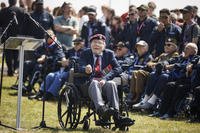How do you help a 27-year-old reservist -- a carpenter in civilian life -- find a new career when he's lost an arm in Iraq? What services can help the World War II vet whose retirement check doesn't stretch far enough?
It takes a vast array of knowledge and skills to answer such questions. The social workers who serve the nation's 26.5 million veterans provide this help every day.
Spotlighting the VA
For social workers seeking to work with veterans, the obvious starting point is the Department of Veterans Affairs. The VA is the country's largest employer of those who hold master's degrees in social work, says Jill Manske, director of social work service in the VA's central office in Washington, D.C.
Veterans' mental health issues -- such as depression, anxiety and post-traumatic stress disorder (PTSD) -- are a major focus of the 4,000 social workers under Manske's direction. But VA social workers also help vets navigate government bureaucracies like Medicare and Medicaid and provide referrals to legal, financial, housing and vocational resources.
Veterans' expectations often depend on their age, says Manske. "Today, they want a prosthetic leg that lets them play basketball," she said.
Inevitably, though, when servicemen become disabled, their first question is how soon they can get back to their unit. After a doctor has explained why they cannot return to active duty, the social worker picks up the pieces.
That means helping servicemen cope with their anger and feelings that they've abandoned their comrades, and then helping them find different vocational opportunities, Manske says.
Older veterans treated by the VA tend to have more complex medical problems. Many have no health insurance, so the VA is their only resource. Social workers can move into clinical areas, such as oncology, where Manske says they "might help [veterans] find equipment they need and locate support groups for them."
VA employment offers excellent benefits, including competitive pay and opportunities for promotions and transfers nationwide. Recent openings for VA social workers included:
- A GS 11-level position paying $48,900 to $63,600 to work in the PTSD program at the VA Medical Center in Louisville, Kentucky.
- A GS 11-level opportunity paying $51,300 to $66,600 at the VA San Diego Healthcare System to provide psychosocial services to the veterans and families served by the center's mental health program.
- A GS 12-level supervisory position paying $63,800 to $90,700 in Asheville, North Carolina.
Why Veterans?
A personal connection, such as having a relative who is a veteran, attracts some students, says Anne Kok, chair of the Social Work Professional Program at the University of Wisconsin at Green Bay. Others become interested as they "think about a population they really want to help," she says.
The VA is affiliated with more than 100 graduate schools of social work, so those who aspire to work with veterans should go through their school to arrange clinical training at a local VA hospital. Even without that "in-house" experience, Manske notes that "in their grad work, social workers get exposed to a variety of training."
Other than those who have focused entirely on child services, she says, "it would be unusual to find someone who doesn't have the knowledge to work in the VA."
Beyond the VA
Outside the VA, a number of opportunities exist for social workers to serve veterans.
Veterans may be more prevalent in rural locations, for instance. In addition, primary agencies -- such as the ones listed under "Social and Human Services" or "Mental Health Clinics" in the phone book -- deal with their share of dishonorably discharged vets, who do not fall under the purview of the VA. In primary agencies, services for veterans may be "folded into broader areas like a drug and alcohol program," Kok says.
Call to Action
Another part of working with veterans is advocacy.
"The complete social worker would work with [a newly disabled serviceman] on the immediate problems of depression and retraining him for another job," Kok says.
On a broader level, the social worker would then focus on ways to create jobs in the veteran community, even lobbying for legislation to fund job-creation, job-training and job-retraining programs.
Find the Right Veteran Job
Whether you want to polish your resume, find veteran job fairs in your area or connect with employers looking to hire veterans, Military.com can help. Subscribe to Military.com to have job postings, guides and advice, and more delivered directly to your inbox.











